| Reviews & Columns |
|
Reviews DVD TV on DVD Blu-ray 4K UHD International DVDs In Theaters Reviews by Studio Video Games Features Collector Series DVDs Easter Egg Database Interviews DVD Talk Radio Feature Articles Columns Anime Talk DVD Savant Horror DVDs The M.O.D. Squad Art House HD Talk Silent DVD
|
DVD Talk Forum |
|
|
| Resources |
|
DVD Price Search Customer Service #'s RCE Info Links |
|
Columns
|
|
|
Going Places
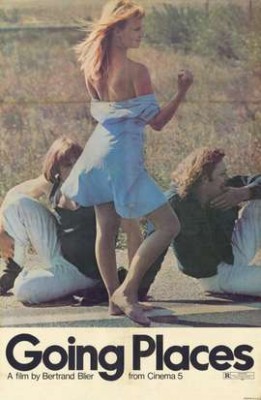
Please Note: The images used here are promotional stills provided by Kino Lorber and from other sources, and are not taken from the Blu-ray edition under review.
Jean-Claude (Gerard Depardieu, young and Byronesquely sexy like he was in Maîtresse) and Pierrot (Patrick Dewaere) are very, very naughty boys. One would not put it so innocuously (the two are overgrown delinquents--lewd, obnoxious wastrels and petty criminals) were it not for their utter guilelessness; they are pure appetite, the Dionysian without the Apollonian, the id without the superego, and they genuinely and sincerely do not have the filters in place that would make them good citizens or decent people. But, as we follow along for their misdeeds as chronicled by Bertrand Blier's 1974 sex farce Going Places (Les valseuses--literally, "the balls") their inexcusably bad behavior comes to seem haplessly charming, mere displays of the overcompensating bluff and bravado a couple of losers on the lam from all the rules and hassles of the straight life need to scrape by. This is hardly a film about redemption or going straight, and their irredeemable aspects stay that way, but the film's triumph is its subtle, gradual revelation that there is much, much more to its characters than even they, in their silly attempts to stay tough, cool, and impervious, can let themselves be aware of.
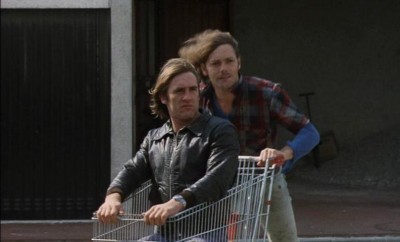
The first we see of our two smart-ass protagonists is their taunting pursuit of a suburban housewife walking home from the supermarket (with Pierrot pushing Jean-Claude in a grocery cart). Her fear of their lewdness only eggs them on and is not entirely unfounded, since their visages are usually broadcasting one form of lust or another. They find her skittishness amusing, but all they snatch from this prudish and rather too self-flattering lady is some of her pastries. Their insatiability and rapaciousness are, however, real; the film is a meandering, digressive road trip that is nothing less than their irrepressibly raunchy, horny odyssey, their relentless pursuit of satisfaction as defined by the Stones. They have no jobs, money, or mode of transport, of course, so they go on whatever dough or vehicles they can manage to steal. When they swipe the wrong car from the wrong guy, a gun-wielding pimp, all they get for their trouble is a testicular injury via bullet for Pierrot and the pimp's bored trophy whore, Marie-Ange (Miou-Miou, The Science of Sleep), who basically lets herself be kidnapped away from her tiresome boss. Marie-Ange is beautiful and gives more than freely of her physical self to both Jean-Claude and Pierrot (though the pair's indulgence in unreconstructed sexual harassment and all-around near-cartoonish insensitivity is problematic, especially at first, I don't think it ever crosses the line into anything remotely like rape), but her frigidity comes as an insult to the two men, whose inability to elicit signs of pleasure from her goes against their hilariously delusional idea of themselves as heartbreaking, womanizing super-studs.
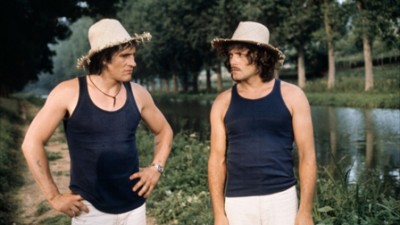
Appetites, impulses, and behaviors that seem straightforward, instinctive, and in no need of discussion or explanation to Jean-Claude and Pierrot (not that they would be capable of introspection even if they wanted it) have their complexity shown to us through their successive sexual encounters, which include: a run-in with a pert, breastfeeding young army wife alone in a train compartment, an interaction that looks potentially ugly at first but turns into something unexpectedly innocuous and sweet (to the extent that Freudian can be sweet, anyway); an older woman, Jeanne Pirolle (played by the legendary Jeanne Moreau (Jules and Jim, The Lovers), who is wonderfully moving here), whom they pick up outside a prison because they assume, correctly as it turns out, that a just-released prisoner will be hungry in every sense, hot to trot, and not too choosy; and the only daughter (Isabelle Huppert (White Material), in one of her earliest screen roles) of a picnicking bourgeois family whose car Pierrot, Jean-Claude, and Marie-Ange are stealing, whose teenage dream it is to get swept away from her hated family/school routine and sexually initiated by the three renegades, which is just what happens. There is even the implication that the oversexed Jean-Claude and Pierrot, when they hit an abandoned seaside town to ransack empty summer houses, need it so badly that they'll even tryst with each other when no woman is available (all proper, illusion-of-pure-heterosexuality-preserving protestations and mockery included, of course).
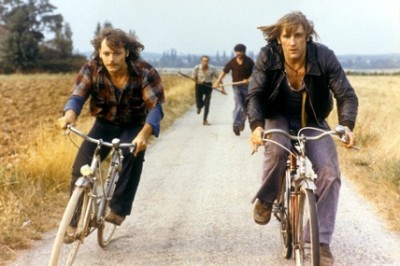
There is much whimsy throughout, but the unpredictable generosity and impulse to share out their freedom that lurks in Pierrot and Jean-Claude's anarchy keeps popping up, as do the sad undercurrents that the French are so good at spotting in sexuality, however uninhibited it might be. The episode with Mme. Pirolle, the ex-con character played by Jeanne Moreau, is perhaps the best illustration of this surprising richness (which the unapologetically bawdy, even somewhat mean-spirited first third of the film would not lead you to expect): the two young, petty criminals and the older, wiser one have a rapport, an understanding, that emerges slowly and amiably in the relaxed, lightly humorous scenes of their getting to know each other before obtaining a hotel room for their inevitable, ecstatic three-way; their real human connection makes Mme. Pirolle's tragic, startling fate all the more shocking. Even that sad bit of trouble has its silver lining, though, as it leads to Jean-Claude and Pierrot falling in with Mme. Pirolle's son, Philippe, who is also just being released from jail. It is young Philippe who, despite being a virgin and a terrible lover, is mysteriously able to bring Marie-Ange to climax at long last, much to her delight and liberation, and much to the chagrin of Pierrot and Jean-Claude, whose pride is insulted over being outdone by such a novice. Marie-Ange's induction into sexual pleasure becomes the film's egalitarian cure for what might at first glance appear to be its rampant sexism: her newfound appetite makes her Pierre and Jean-Claude's comrade, puts her on an equal footing with them. At the film's graceful close, we watch them drive off together as a libidinous, perfectly matched threesome, a band of outsiders that has decided it's okay to drift, enjoying the ride and not being all that concerned or certain about where you're going, right up until the moment you run out of gas.
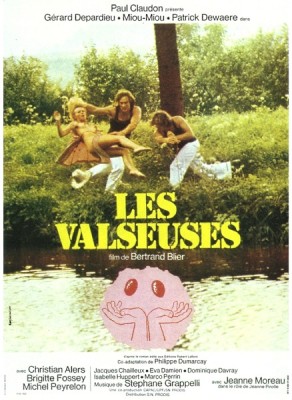
Just as it would seem that a film so raunchily, wildly sexy and funny has no right to be so effectively sweet and thoughtful, too, one might feel that such an overt, unromantic celebration of our animal nature should not risk exceeding its grasp by being visually inventive and beautiful as well. But that is what Blier goes for here, and, with the aid of cinematographer Bruno Nuyten's fantastic work, he absolutely gets away with it. The numerous sight gags are elegant, finely lit and framed even as they make us laugh out loud, and some of the sun-dappled, breeze-blown rural scenes are as lovely and alive as great landscape paintings. In the end, that might be what makes Going Places such an excellent film, and one that stays with you despite its apparent whimsical trashiness: it embodies contradictions in an extraordinarily unique, completely successful way, and it makes it look easy.
THE BD:
The seemingly incongruous yet somehow perfect naturalistic beauty of Bruno Nuyten's cinematography, with its alternating soft, pastoral/open-road sunlight and dark, crumbling, neon-lit suburban flatness and darkness, is wonderfully preserved and free of any compression artifacts or other visual flaws. All colors are solid, with very little combing and no noticeable interlacing, on this lovingly restored, AVC MPEG-4, 1080p, 1.85:1 aspect-ratio, anamorphic-widescreen transfer.
Sound:The French DTS 1.0 mono soundtrack (with optional, fairly well-translated English subtitles) is fully dimensional, rich, and clear as can be at every level, from dialogue and traffic noise to Stéphane Grappelli's jaunty score. (You can actually hear the plucking of the stand-up bass). It's an overall terrific job on the sound to match the conscientiously transferred images.
Extras:Just the original French theatrical trailer and a handful of stills from the film, but this trailer is one of the funniest, most inspired and clever previews you have ever seen. It consists of a series of drawings that less and less subtly riff on the film's French title, Les Valseuses (The Testicles), topped off with hilarious tongue-in-cheek narration. It is a small extra, but it is very good stuff.
FINAL THOUGHTS:A crazy, wacky, often actually slapstick, and very risqué sex comedy that nonchalantly backs its way into the light of sweetness and simple human kindness without even considering compromising its anarchic, rebellious edge, Bertrand Blier's Going Places is a real gem of a movie that Kino has now polished up to look its very best for this Blu-ray release. And none too soon; this one is ripe for rediscovery by a new generation of home-theater cinephiles as a too seldom-invoked classic of post-New Wave French cinema. Highly Recommended.
|
| Popular Reviews |
| Sponsored Links |
|
|
| Sponsored Links |
|
|
| Release List | Reviews | Shop | Newsletter | Forum | DVD Giveaways | Blu-Ray | Advertise |
|
Copyright 2024 DVDTalk.com All Rights Reserved. Legal Info, Privacy Policy, Terms of Use,
Manage Preferences,
Your Privacy Choices | |||||||












